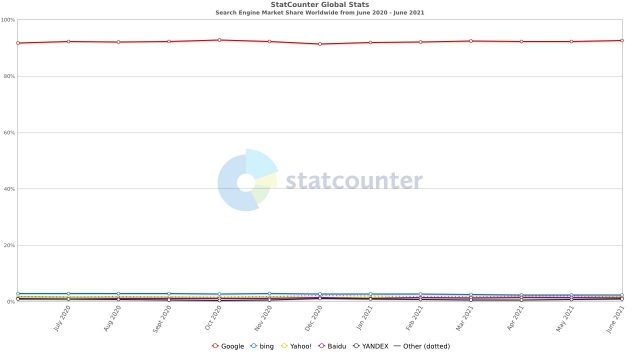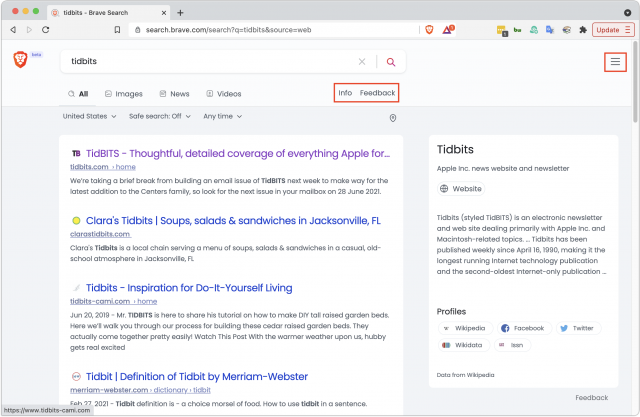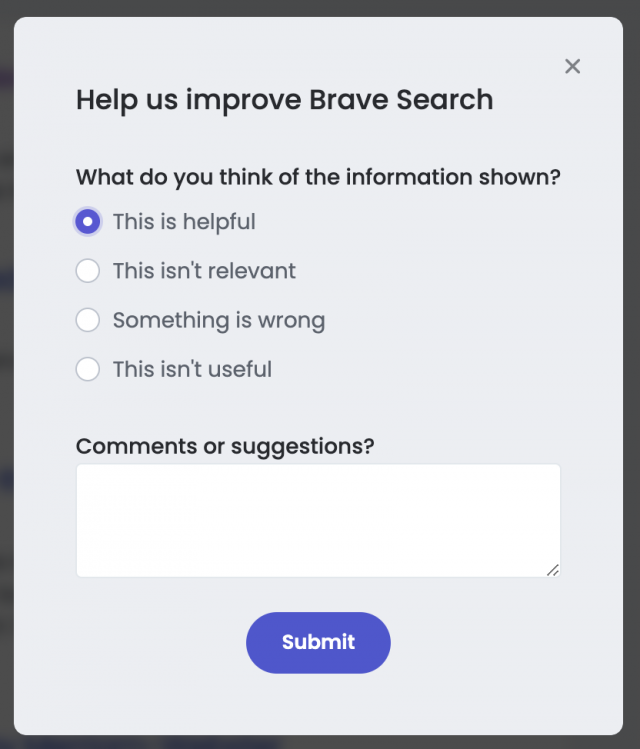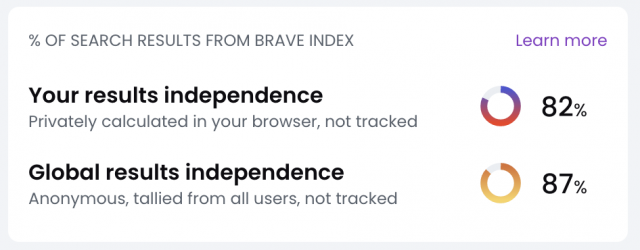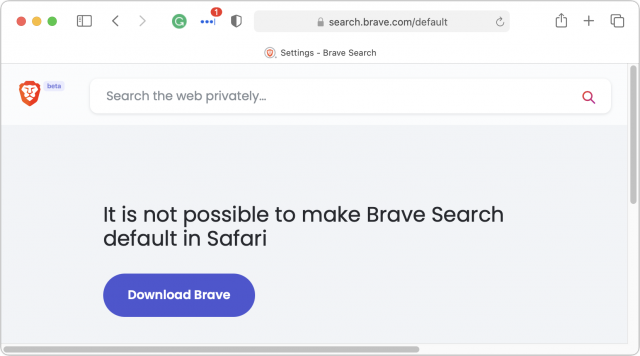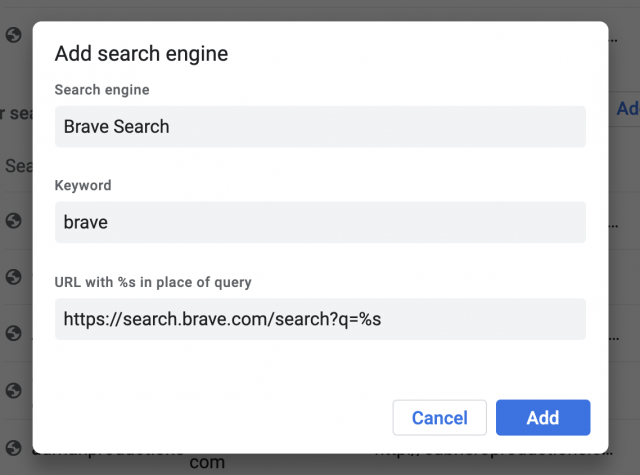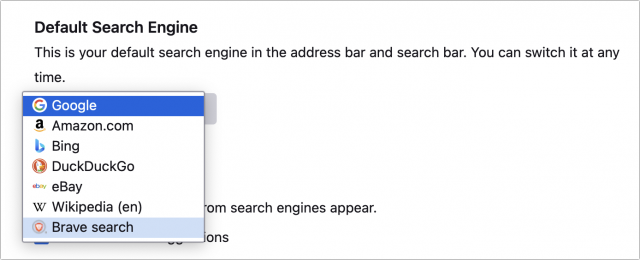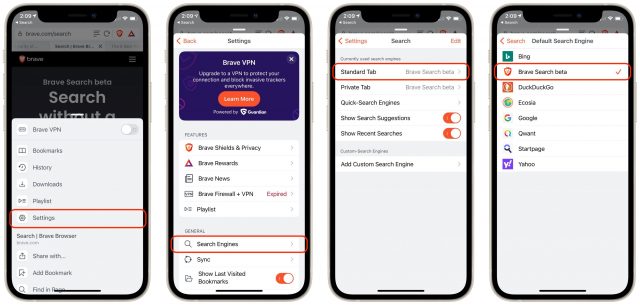
Google has risen to its position of dominance in the tech world on the back of its search engine, which has no effective competition. According to StatCounter, Google has 92.49% of the worldwide search engine market share, with Microsoft Bing second at 2.31% and Yahoo Search(based on Bing) at 1.53%. Is there room for a new search engine, such as the just-announced Brave Search? Perhaps, if it can combine quality search results with a focus on privacy.
That’s because Google’s business model revolves around tracking and profiling users and then using that information to underpin the targeting of ads. For some people, that’s become anathema, pushing them to switch to DuckDuckGo (also based on Bing, see “Search in Private with DuckDuckGo,” 20 August 2014). But DuckDuckGo has acquired only 0.6% of the market.
I’m not as perturbed by Google’s business model as many people are because I think Google services generally make the world a better place. (Unlike other companies I could mention.) To varying extents, I like and use Google Search, Gmail, Google Docs, YouTube, Google Maps, Google Photos, and Google Translate. Though I don’t use either, Android and Chrome OS have made a positive impact overall, too. Other subsidiaries of Google’s parent company Alphabet, like healthcare innovation company Verily and the self-driving car firm Waymo, offer a vision of a better technology-enabled future.
Nevertheless, there are times when I get tired of thinking about Google tracking my Web searches and bundling that information into my online dossier—check My Activity to see what Google knows about you. So when Apple made it possible to use the Ecosia search engine from Safari’s address bar late last year (see “Apple Releases Apple Fitness+, macOS 11.1 Big Sur, iOS 14.3, iPadOS 14.3, watchOS 7.2, and tvOS 14.3,” 14 December 2020), I decided to give it a try.
Put bluntly, Ecosia failed. It’s not that it didn’t work, nor did it always provide poor results. But too often, I’d find myself questioning its results or knowing they weren’t what I wanted. Ecosia relies on Bing, just like DuckDuckGo (which I’ve tried and discarded in the past as well), so I gave up and went back to Google. I’m all in favor of privacy, but not at the expense of frequent search failures.
Introducing Brave Search
When Brave first released Brave Search in private beta, I jumped at the chance to try it. And you know what? It was pretty darn good. Now and then, I’d find myself sending a search directly to Google after Brave Search didn’t find what I wanted, but it passed the annoyance test that Ecosia and DuckDuckGo had failed. It probably didn’t hurt that Brave was upfront about how Brave Search was in beta—it wasn’t pretending to be a finished product. Brave soon moved Brave Search into public beta, and that’s where we stand now.
Happily, Brave Search passed my initial litmus test—knowing that a search for “tidbits” should put TidBITS above a Florida sandwich shop, even without knowing anything about me, unlike Google. I like it already.
Searches work as you’d expect, with a ranked set of results and options at the top to focus the results on images, news, and videos. There are no ads at the moment, and I find the results clean and easy to read. All search results can be filtered by country (so searches on “penguins” finds the Pittsburgh Penguins for the US, but the penguins at the Adelaide Zoo for Australia), along with a safe search (presumably to filter smutty results), and time (so you can see only recent pages). With images, sub-filters let you limit the results based on size, type, layout, and color. Videos can also be sub-filtered by duration and resolution.
The main reasons to try the Brave Search beta now are that it is:
- Private: All searches are entirely anonymous and private, with absolutely no tracking of queries. The user comes first, not the advertising or data-collection industries.
- Independent: For Brave Search, Brave purchased the Tailcat search engine developed by a company called Cliqz. As long as the search result quality is there, I approve highly of a search engine that’s not from Google or Microsoft.
That said, while Brave Search remains in beta, it’s not entirely independent. As the company explains, it currently makes anonymous API calls to other search engines to check the quality of the results to make sure they are at the level users expect. Either way, you can click the Feedback button and share your opinion about whether the results are helpful, irrelevant, incorrect, or simply not useful.
Brave reports on how independent its results are for every results page (click the Info button) and in aggregate in the settings (click the hamburger button at the top right of the page). In the settings, Brave reports on the percentage of results for your queries that come from Brave’s index (82% and rising for me right now) and the global percentage of all worldwide searches that come from Brave’s index (87%). If you don’t want this to happen, you can turn off Google Fallback Mixing in the Brave Search settings (again, click the hamburger button on any search results page).
Brave has also promised a pair of initiatives that point to a better searching future:
- Choice: Brave says it will soon give users the choice of an ad-supported search (still without tracking) or an ad-free paid search. Finally, a chance for those of us who want to avoid ads to put our money where our mouths are.
- Community: Although Brave Search has its own proprietary ranking algorithm, the Tailcat developers have proposed a system called Goggles that lets users explicitly rerank results using community-created filters that instantiate their preferred biases.
The Goggles proposal is interesting and worth a read. In essence, it offers a way to create a plurality of rankings rather than require users to submit to a single ranking, even one that attempts to personalize itself to their desires. The paper suggests that the community might create Goggles that would focus on only high-quality tech blogs, product reviews that don’t have commercial intent, minor news outlets in particular countries (instead of just major newspapers), or recipe blogs vetted by particular cooks. There’s no way to avoid confirmation bias, but the Goggles system makes that reality explicit and supports those who wish to explore outside their biases. That’s all in the future, of course, and we’ll see how effective it is if and when it ships.
Setting Up Brave Search
You can use Brave Search in any Web browser by loading https://search.brave.com/. That’s fussy, though, and in most Web browsers other than Safari, there are ways to enter anything you want as a default search engine so you can search from the address bar. We can hope that Apple adds Brave Search to Safari’s search engine list soon—I’ve submitted it as a suggestion via Apple’s Feedback Assistant app, and I’d encourage others to do the same.
The easiest way to use Brave Search is in the Brave browser itself, of course, where you can navigate to Settings > Search Engine and choose Brave as the search engine used in the address bar. (If you don’t see this option, quit and relaunch Brave to install the latest update.)
The process isn’t much more difficult in Google Chrome and other Chromium-based browsers like Microsoft Edge. Go to Chrome > Preferences > Search Engine > Manage Search Engines, and click the Add button. Enter the details for Brave Search as in the screenshot below (the key is the https://search.brave.com/search?q=%s URL).
Then scroll down in the list of search engines to find Brave, click the three stacked dots, and choose Make Default.
In Firefox, there’s a Brave Search add-on that, when added to Firefox, lets you choose Brave Search as your default search engine in Firefox > Preferences > Search.
In iOS, the main way I can see to use Brave Search is to use the Brave app as your default Web browser. On any page, tap the ••• button at the bottom right of the screen, then navigate to Settings > Search Engines > Standard Tab > Brave Search beta.
It’s important to remember that Brave Search is still in beta, so it may not perform as well as Google. Realistically, it’s not likely to be as good as Google for quite some time—that’s an awfully high bar. However, I’ve been using Brave Search exclusively on my Mac for several weeks now, and only a few times have I explicitly switched to a Google search to see if I’d get better results. Perhaps we’re entering a brave new search world!
Contents
- New Members
- Two Siri Remote Sleeves That Incorporate AirTag Pockets
- The Ultimate Guide to Choosing Apple/Beats Audio Gear
- The Hidden Trick for Capturing Document-Modal Dialogs in Mac Screenshots
- Brave Search Public Beta Offers Alternative to Google
- Apple Opens Public Betas for macOS 12 Monterey, iOS 15, iPadOS 15, watchOS 8, and tvOS 15
- Apple Justifies iOS App Store’s Tight Control in White Paper

